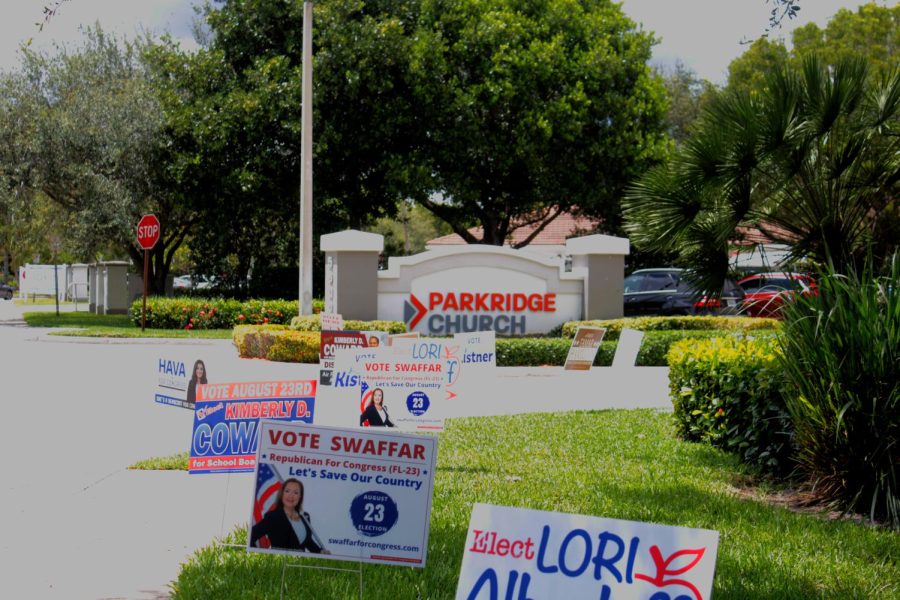Your donation will support the student journalists of Marjory Stoneman Douglas High School. Your contribution will allow us to purchase equipment and cover our annual website hosting costs.
Florida primary candidates compete for party nomination
August 23, 2022
While early voting has already begun, on Tuesday, Aug. 23, the primary elections in the state of Florida will take place. On the ballot on the Aug. 23 primary election are the Broward County Public Schools’ tax referendum, the Democratic primary for U.S. Senate, Governor and Florida Attorney General, the Democratic and Republican primary for Florida’s Commissioner of Agriculture, Broward School Board District Four and Broward School Board District Eight At Large.
In other areas of Broward County, School Board Districts One, Five, Six and Seven are up for re-election.
Anyone unaware of their voting location can find their voting precinct on Vote.org. The deadline to register to vote for the November midterm elections is Tuesday, Oct. 11.
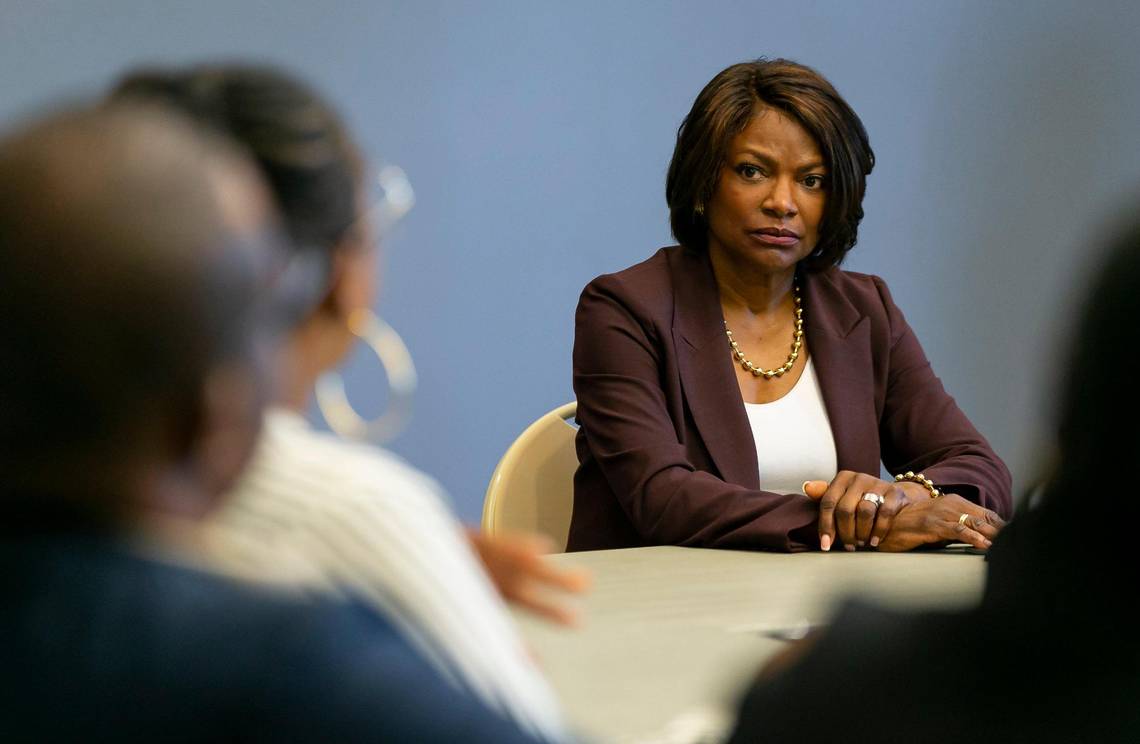
Tribune News Service
U.S. Rep. Val Demings, D-Fla., listens to local Haitian leaders while campaigning at the Wildcat Center on Monday, Aug. 1, 2022, in North Miami, Fla. Demings is running against U.S. Sen. Marco Rubio. Courtesy of Matias J. Ocner/TNS.
Rep. Val Demings leads polls in Democratic primary for U.S. Senate
Republican Senator Marco Rubio’s seat is up for re-election in November. While Rubio’s primary was canceled and he will advance to the general election, several Democratic candidates are competing to secure their spot as the Democratic nominee.
Democratic candidates include Rep. Val Demings, former candidate for U.S. House Ricardo De La Fuente, former state Rep. Brian Rush and former Special Counsel for the U.S. Department of Justice, Office of Special Counsel and Unfair Employment Practices William Sanchez. Sanchez is also known for suing Florida Gov. Ron DeSantis over the elimination of Disney’s district.
Many candidates have similar views on important issues such as housing, the environment, the economy and healthcare. However, other important issues to voters this November include abortion, gun control, student debt, voting rights and the rights of parents.
Demings is the only candidate currently holding office and recent polls show her as the top choice in both the Democratic primaries and in the race against Rubio.
She started out as a social worker before becoming a police officer for 27 years. She was the first female police chief of Orlando, holding the position from 2007 to 2012. According to her campaign website, she reduced crime in Orlando by 40% during her time as police chief, and she was elected to the House of Representatives in 2016.
“Raised in a two-bedroom, A-frame home in Jacksonville, the youngest of seven children, Val Demings grew up knowing the value of a job and a dollar. Her parents, Elouise, a maid, and James, a janitor, did all they could to support their children and instill in them the meaning of hard work,” Demings’ campaign website said. “As a teenager, Val worked flipping burgers to help support her family. Now, as a Member of Congress, Val Demings works to ensure anyone willing to work hard can find a job that does more than just pay the bills — a job that can help build a better life for your children.”
On June 9, 2022, Demings introduced a plan with the New Democrat Coalition to fight inflation. In contrast, Rush believes the blame for inflation lies in the “overspen[ding]” of Congress.
Sanchez offers several solutions to major economic issues for Floridians such as housing, jobs and unions. His goals are to invest in public housing, broaden states’ abilities to create rent control standards and leverage federal funding to bring rent down by 10% with the American Housing and Economic Mobility Act.
Regarding jobs, he hopes to pass bills that would stop corporations from forcing employees to attend anti-union meetings, prevent employers from discriminating against the immigration status of their employees, let independent contractors unionize and penalize companies that violate labor laws. He supports a $15 federal minimum wage, something President Joe Biden already enacted for federal employees.
As Americans struggle to afford basic necessities, the $15 federal minimum wage is hailed by Democrats as a way to allow Americans to afford housing and food. Besides helping lessen the effects of inflation, many Democrats feel that cutting student debt will improve the financial situations of many Americans.
Demings supported “The Heroes Act” in 2020 that included $10,000 in federal student debt cancellation and referred to millennials in a June 2018 tweet as “among the poorest generations, saddled with nearly $1.5T in student debt and the lowest saving rate of workers.”
Sanchez wants to eventually make public universities tuition-free, though for those already with student debt, he adopted Sen. Elizabeth Warren’s plan to cancel up to $50,000 worth of federal student loan debt for 95% of borrowers.
“A multilingual second-generation immigrant, Ricardo de la Fuente was raised on the work ethic that made America great. […] In his work in green energy entrepreneurship, assisted living modernization, and small business advocacy, he has applied those skills for real change. As a philanthropist, he has raised hundreds of thousands of dollars for charities fighting against cancer, homelessness, and child poverty,” de la Fuente said on his campaign website. “With his wide and varied experience in bringing people together and supporting those in need, Ricardo is ready to fight for Florida’s future through the creation of meaningful well-paid jobs in green energy, infrastructure, and technology.”
Along with Sanchez, Rush also supports the transition to “green,” renewable energy instead of the United States’ “current over-reliance on carbon-based energy.”
The transition is a “hot-button issue” in recent years as people around the globe fear the consequences of climate change, which many experts say humans are already experiencing. They point to the record heat waves across the United Kingdom this summer and the rise in the number and severity of wildfires in California and Australia.
“Here in Florida, our environment is our greatest treasure and our most important economic engine. Florida’s natural beauty, beautiful beaches, and clean air and water fuel our tourism-based economy. Chief Val Demings takes threats to our environment seriously, because they are threats to Floridans’ jobs and ways of life,” Demings’ campaign website said. “That’s why she opposes offshore drilling off Florida’s coasts, and why she has delivered funding to combat the toxic algae that impacts our shores and waterways. Chief Demings knows the threat of climate change is real, and that’s why she supported the bipartisan infrastructure bill which will fund billions of dollars of climate change-resistant infrastructure in Florida and create thousands of new jobs.”
The bipartisan infrastructure bill was signed into law by Biden on Nov. 15, 2021, and would clean up Superfund and brownfield sites and cap orphaned oil and gas wells.
More recently, Biden signed the Inflation Reduction Act into law on Aug. 16, which included sweeping actions to reverse the effects of climate change. It passed after Sen. Joe Manchin reversed his opinion on the bill, paving the way for the bill to be passed in the Senate. Demings supported the act.
Sanchez supports another climate bill hailed by Democrats that has not garnered enough support to be passed: the Green New Deal, introduced by Rep. Alexandria Ocasio-Cortez in 2019. The Green New Deal calls on the federal government to dramatically reduce greenhouse gas emissions and establish that access to clean air, clean water and healthy food are human rights.
Additional climate priorities of Sanchez include joining Europe to create a carbon tax on the biggest emitters in the U.S. and strengthening the Environmental Protection Agency’s power to create regulations to keep Florida’s waters safe.
“We wouldn’t let our neighbors dump their garbage into our backyard, so why do we allow corporations to do the same?” Sanchez’s campaign website said.
Healthcare is another contentious, important issue to Americans. Medicare for All, while controversial among Republicans, is one solution commonly proposed by Democrats. Rubio does not support Medicare for All, as he believes it will raise Americans’ taxes. Medicare for All, if implemented, would give federally-funded insurance to all Americans.
However, Sanchez supports the plan, as well as expanding existing Medicare coverage to include hearing aids, vision and dental care. Others in the race propose less all-encompassing plans, such as lowering drug costs and affordable healthcare.
“Chief Demings believes that every American deserves access to high-quality, affordable health care. She knows that every day, too many Floridians are choosing between seeing the doctor or filling a prescription, and paying the utility bill or the rent,” Demings’ website said. “That’s why the Chief will fight to lower the cost of prescription drugs and stand up to the special interests who want to undermine protections for people with pre-existing conditions like diabetes or asthma.”
De la Fuente expressed similar solutions to Demings.
Reproductive healthcare, in wake of the reversal of Roe v. Wade, is one of the largest and most divisive issues on the ballot this November. Rubio remains firmly against abortion, but it is commonly supported by Democrats and by his opponents.
“Let me be clear: a woman should have the right to choose,” Demings said at a conference for abortion advocacy group Ruth’s List in Orlando on May 14.
She, as the only female candidate for Rubio’s seat, felt personally affected by the decision by the Supreme Court in June, as “a woman, a mother [and] a woman of faith.” She helped introduce the Women’s Health Protection Act in the House, which would protect a person’s choice to terminate a pregnancy and a healthcare provider’s ability to provide abortions. The bill was blocked by the Senate.
“For more than thirty years, Brian Rush has supported the Roe v. Wade viability standard and Florida’s unique Constitutional Privacy Amendment, which protects a woman’s autonomy and her private decision to terminate her pregnancy, free from government interference,” Rush’s campaign website said.
Sanchez believes in the right to choose as well, and hopes to “properly” fund Planned Parenthood to provide those services “increased access to contraceptives and safe abortions.”
Recent polls show a tight race between Rubio and Demings, so it is unclear whether Rubio’s seat will remain Republican or flip over to the Democrats.
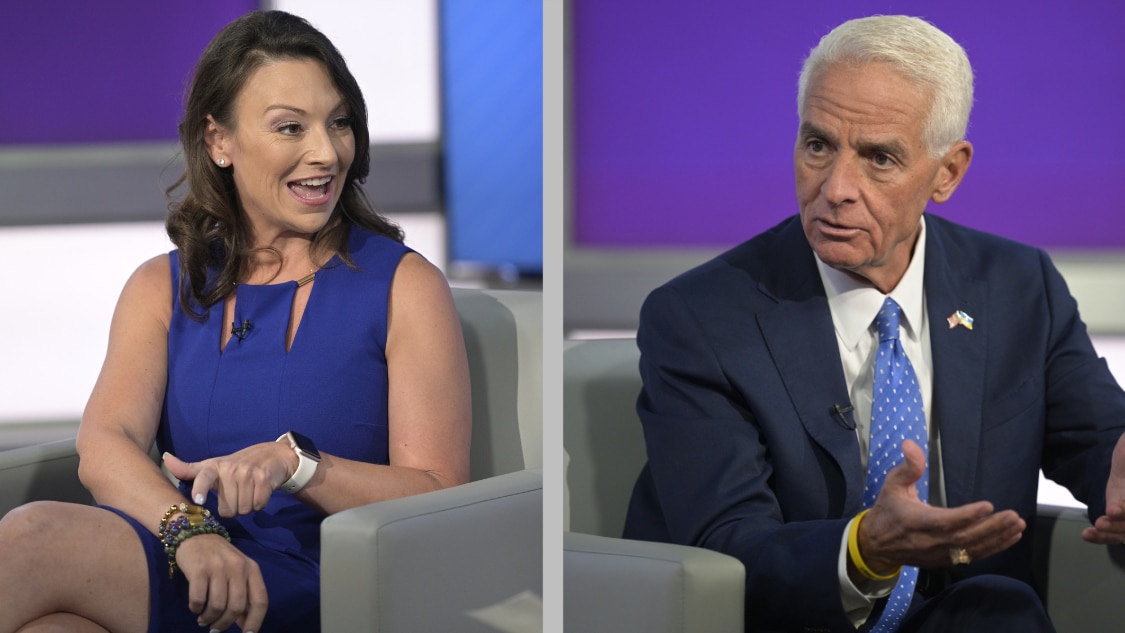
Tribune News Service
Nikki Fried and Charlie Crist, seeking the Democratic nomination for Florida’s governor, participate in an interview with Florida media members on Wednesday, Aug. 3, 2022. Courtesy of Phelan M. Ebenhack/TNS.
Charlie Crist and Nikki Fried compete in tight race for Democratic nomination for Governor
While incumbent Florida Gov. Ron DeSantis runs uncontested in the canceled Republican primary, Democratic candidates are competing in a tight race. The Democratic candidates are former Republican Florida Governor Charlie Crist, small business owner Cadance Daniel, current Florida Commissioner of Agriculture Nikki Fried and elementary school teacher Robert Willis.
Currently, polls show Fried and Crist as leaders in the race. Fried is the only statewide elected Democrat at this time.
A defining characteristic or issue of this election is freedom, something DeSantis parades Florida as the center of. His “freedom agenda” includes parental rights and the rights of families, an economy that “outpac[es] the nation,” keeping Florida safe and beautiful, protecting secure and non-fraudulent elections and being pro-military and veteran-friendly.
In fact, California Gov. Gavin Newsom went so far as to air an ad in Florida on July 4 about freedom and attacking Florida Republican leaders, showing how central the idea of “freedom” is to the election in Florida this November.
“Freedom is under attack in your state. And Republican leaders? They’re banning books, making it harder to vote, restricting speech in classrooms, even criminalizing women and doctors,” Newsom said in the ad. “I urge all of you living in Florida to join the fight or join us in California, where we still believe in freedom.”
Fried also is campaigning on freedom, with a priority issue for her on her campaign website listed as “freedom for all Floridians.” Her policy ideas to accomplish this include expanding civil rights, trusting local governments and rebuilding home rule, appointing an LGBTQ+ liaison, repealing Florida’s sodomy law, ensuring Florida’s Medicaid program includes gender-affirming care, removing discrimination from foster care and ensuring LGBTQ+ students feel comfortable at school by providing anti-bullying resources to Florida schools.
While Crist does not specifically campaign on the idea of “freedom for all,” he does have policy ideas for “justice for all.” He wants to reform Florida’s justice system by reforming sentencing and supporting SB 1032, which died in the Florida Senate. The bill would allow rehabilitation credits to include a high school or its equivalent diploma, a college degree, a vocational certificate, a drug treatment program, a life skills program or a reentry program. The expansion of conviction review units and the improvement of data collection are other reforms Crist has proposed.
He also invokes freedom in the “freedom to learn,” which involves his education plan.
As more teachers and school staff leave their positions and fewer people become school staff, Florida has been hard-hit and Crist finds it necessary to declare a teacher and staff shortage emergency. He also proposes increasing salaries for teachers and other staff, including more school counselors, to attract more people to the position or keep people from leaving; by 2026, the starting salary would be over $47,500 and the average veteran salary would increase to meet the national average of $67,000. Fried also would increase veteran salaries but did not cite specific figures. Crist would also qualify teachers for special risk retirement.
One of many factors pushing people away from teaching is gun violence, something that exploded again in national news in wake of the shooting at Robb Elementary School in Uvalde, Texas. Crist wants to “harden schools against gun violence.” While he does not provide specific changes in his education plan, his safety plan includes banning the sale of assault weapons, requiring background checks, “cracking down” on ghost guns and gun trafficking and requiring lost or stolen firearms are reported. Fried’s proposal to target gun violence is closing the gun show loophole and banning ghost guns and Daniel believes guns should not be sold to those under 21 and that the state should mandate training for all gun owners.
The per-student spending, he proposes, should be increased to the national average. The national average is $15,520, while Florida’s is $10,000, according to the Education Data Initiative, and Fried wants to double Florida’s current spending.
Crist also hopes to improve Exceptional Student Education (ESE), make Education Commissioner an elected position, invest in Science, Technology, Engineering and Mathematics (STEM) and life skills education, expand and improve Career and Technical Education (CTE) and broaden access to Advanced Placement, dual enrollment or International Baccalaureate programs.
“From Governor DeSantis shaming children for wearing masks at a press conference, to the Legislature withholding school recognition grants for districts enforcing a federal COVID-19 mask mandate, the way Florida’s Republican leadership has treated the children of Florida is a disgrace,” Fried’s campaign website said. “I envision a brighter future for Florida. But we’ll never get there if Florida doesn’t have the best schools in the nation. When I’m governor, we will.”
Crist wants to open VPK programs to three-year-olds. Fried, while not adopting that proposal, has her own plan for VPK, including additional supplement spending to accommodate eight-hour work days for parents and mandating salary increases for childcare teachers from $11.78 an hour to $15.00.
Applicable to MSD students, Fried wants to expand Bright Futures scholarships and explore tuition-free community colleges for certain students.
The last proposal in his education plan is stopping “the unwarranted politicization of our classrooms and attacks on our educators,” something commonly used in reference to Florida’s controversial “Parental Rights in Education” law, more commonly known as the “Don’t Say Gay” law.
The repeal of the law is listed in his “Equality for All” plan. In addition, the plan suggests ordering an investigation regarding conversion therapy as child abuse and protecting gender-affirming healthcare; one act to protect gender-affirming healthcare, he believes, is firing Florida Surgeon General Joseph Ladapo, who rejected medical treatment for transgender youth. Like Fried, Crist believes that appointing regional LGBTQ+ liaisons would help keep him updated about any issues the LGBTQ+ community in Florida are facing.
“My message to LGBTQ youth of our state is this. Your existence is never inappropriate,” Crist said on his campaign website.
One of Crist’s unique plans is the establishment of “the Office for New Floridians,” to help people who just moved to the state.
In commonality, both Crist and Fried support legalizing marijuana, removing misdemeanor or third-degree felony marijuana charges, expanding Medicaid, affirming abortion rights and making housing more affordable in Florida through the Sadowski fund, rather than allocating it to an unrelated subject. Crist would issue an executive order protecting access to abortion and veto anti-abortion legislation that would be passed through the Florida legislature.
“Florida has never had a female governor. And it shows,” Fried said on her campaign website. “On my first day in office, I will work to repeal the regressive limitation on a woman’s right to make her own healthcare choices, HB 5.”
To learn more about each of the candidates, people can explore Fried, Crist, Willis and Daniel’s campaign websites.
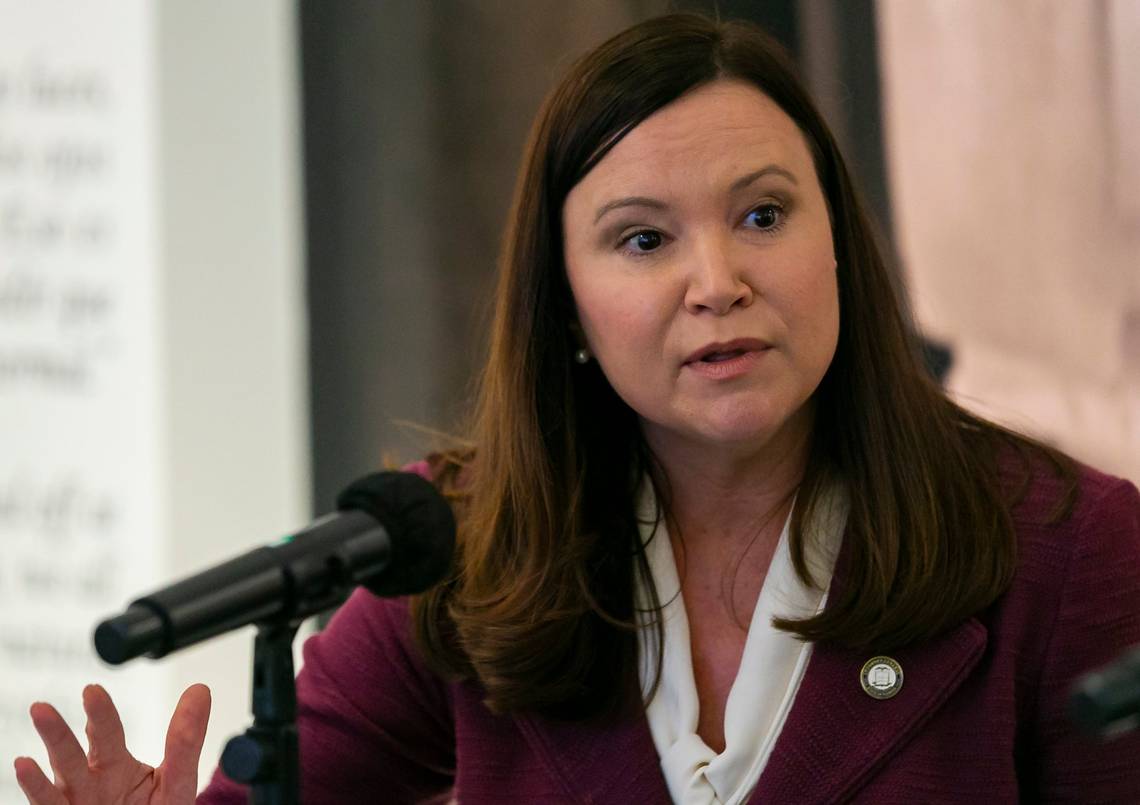
Tribune News Service
Attorney General Ashley Moody speaks during a roundtable discussion at the American Museum of the Cuban Diaspora in Miamis Coral Way neighborhood on Monday, February 7, 2022. Courtesy of Matias J. Ocner/TNS.
Abortion debate plays big role in race for Florida Attorney General
Republican incumbent Florida Attorney General Ashley Moody’s term is up. She ran uncontested and advanced to the midterm in November.
However, three Democrats are racing to beat Moody: former state attorney for the Ninth Judicial Circuit Court Aramis Ayala, former Orange County state attorney and assistant statewide prosecutor for Attorney General Bob Butterworth Jim Lewis and trial attorney Daniel Uhlfelder.
Ayala, Lewis and Uhlfelder all prioritize protecting abortion rights in the state of Florida. Ayala lists this as her “top priority,” though other issues that fall under the same branch of knocking down actions she views as “unconstitutional” by the state in recent months. She cites the “Parental Rights in Education” law, or the “Don’t Say Gay” law, and Florida’s redistricting map.
Another priority of Ayala’s is keeping the separation of church and state, a topic that has been heavily debated in recent months, as religion is a central topic when speaking of abortion rights. In Florida, there was a lawsuit by a synagogue in Boyton Beach alleging that Florida’s 15-week abortion ban violates their freedom of religion. Another case that involves this argument is the Supreme Court case that allowed a high school football coach to pray before a game on the field.
One of Lewis’ top priorities is cooperating across party lines, instead of following the common pattern of increased partisan tensions. A Pew Research Center study showed that partisan hostility is rising among Americans.
“It’s time to move away from extreme partisan politics and work together for the people of this great state,” Lewis’ campaign website said.
In a similar line, Uhlfelder prioritizes defending democracy from what he calls “GOP assaults.” He cites Moody, who signed a letter supporting Texas Republicans that filed a lawsuit in an attempt to overturn the 2020 election.
Other priorities for Ayala include fighting the National Rifle Association, investigating nursing homes that scam Florida’s seniors, prosecuting fraudulent insurance companies, providing access to safe, affordable housing and defending workers’ rights.
Environmentally, Ayala would decrease Florida’s usage on fossil fuels by transitioning to clean energy, crack down on illegal polluters and expand access to safe drinking water for all. Lewis also wants to protect the environment by prosecuting people who threaten Florida’s natural resources.
Lewis’ priorities are protecting voting rights, “keep[ing] extremism out of state government,” allowing local governments to exercise their powers and refusing to jail people for marijuana possession.
Uhlfelder’s priorities include targeting utility companies, oil companies, corporate developers and insurance companies that raise prices too high for consumers to be able to pay.
In the race to be Florida’s Attorney General, it appears that the Supreme Court’s overturn of Roe v. Wade is central to the fight, though it remains to be seen which side Florida voters will choose.
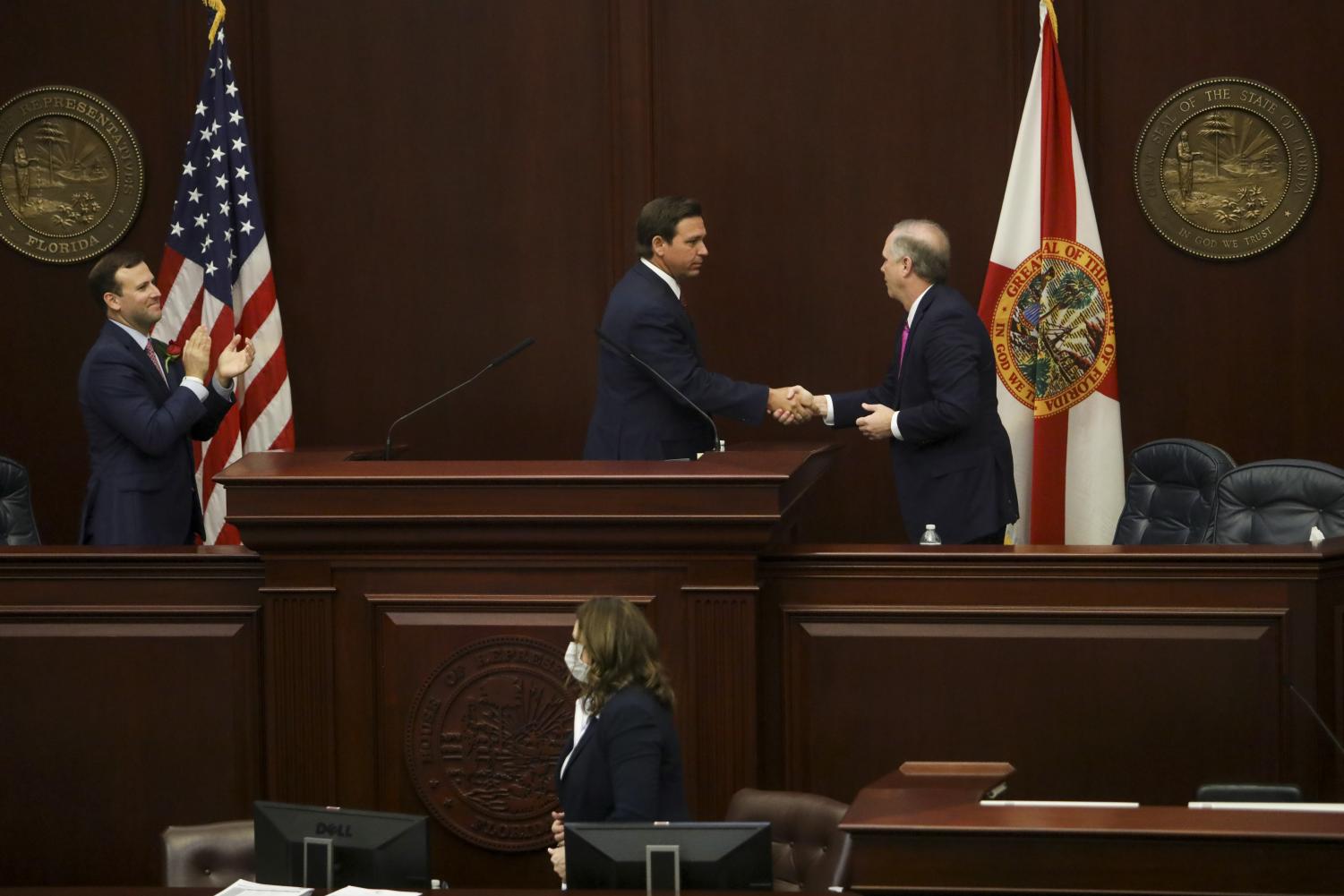
Tribune News Service
Gov. Ron DeSantis shakes hands with Senate President Wilton Simpson, R-Trilby, at the Capitol in Tallahassee during Opening Day of the Florida Legislature on March 2, 2021. DeSantis has endorsed Simpson in the Republican primary for agriculture commissioner, ending speculation. Courtesy of Ivy Ceballo/TNS.
Republican and Democratic candidates seek to win party nomination for Florida Commissioner of Agriculture
Incumbent Florida Commissioner of Agriculture Nikki Fried is running for governor, leaving her position open for new candidates. Fried is the only statewide-elected Democrat in Florida, so it is unclear whether Florida voters will once again choose a Democrat to be Commissioner of Agriculture or follow Florida’s growing Republican support.
The two Republicans running for Florida Commissioner for Agriculture are organic farmer James Shaw and President of the Florida Senate Wilton Simpson.
There are three Democrats running for Florida Commissioner of Agriculture: committeewoman for the Miami Dade Democratic Executive Committee in District 15 Naomi Blemur, small business owner Ryan Morales and J.R. Gaillot, who is studying to get a Master’s in International Relations at Harvard University.
Shaw’s agricultural priorities are protecting the consumer and letting farmers farm. Simpson believes in the Right to Farm Act, the strengthening of Florida’s greenbelt protections, advocacy for Florida’s citrus growers and the support of agritourism.
Blemur’s views on agriculture are“aligned with the 17 sustainable development goals (SDGs) of the United Nations,” which are: no poverty, zero hunger, good health and well-being, quality education, gender equality, clean water and sanitation, affordable and clean energy, decent work and economic growth, industry, innovation, infrastructure, reduced inequality, sustainable cities and communities, responsible consumption and production, climate act, life below water, life on land, peace and justice, strong institutions and partnerships to achieve goals.
Gaillot wants to protect farmers and the environment, improve farmer practices and protect Florida’s water through multiple practices. Morales wants to increase marijuana production in Florida and decriminalize it, something Gaillot and Blemur also support, increase usage of biofuels, clean Florida waters, use precision agriculture, improve current Best Management Practices, transform lawns into gardens, eradicate invasive species, provide incentives for small farms and put Florida first.
Shaw’s other priority is protecting the right to own guns, which Simpson agrees with. Simpson supports anti-abortion measures, reforming the foster care system, the Parent’s Bill of Rights, election integrity, fighting vaccine mandates, backing police officers, the military and veterans, expanding school choice, investing in Florida infrastructure and “keeping Florida affordable.”
Gaillot also supports making Florida affordable, as well as protecting marginalized and poor communities, eliminating predatory practices such as spam calls or identity theft and protecting children and the elderly. Blemur maintains her positions of thoroughly evaluating all applications for concealed carry, encouraging home-based food production, shifting to clean energy and building a hemp economy.
People can learn more about Shaw, Simpson, Blemur, Gaillot and Morales’ campaign platforms and issues on their individual websites.
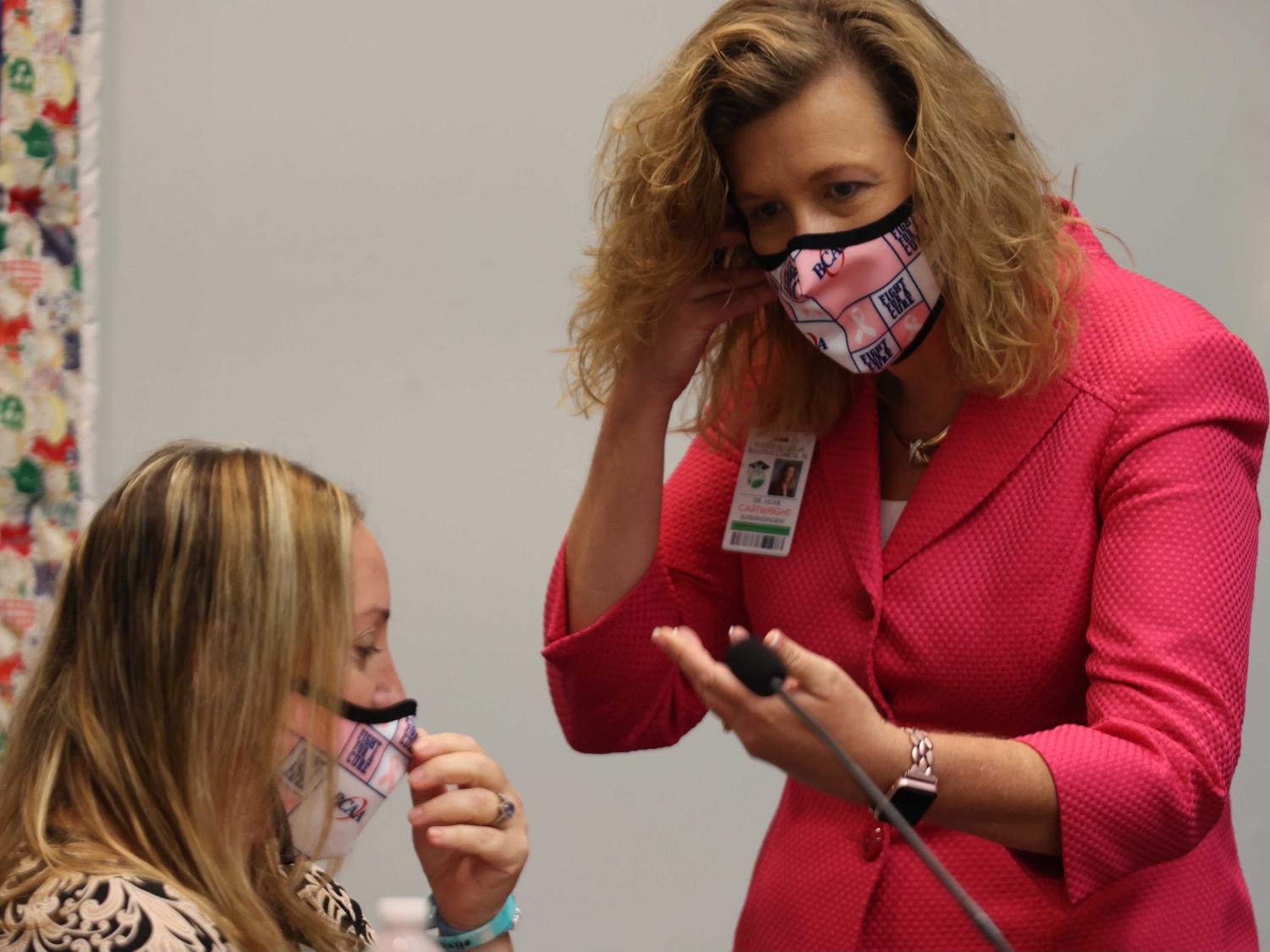
Tribune News Service
Broward Schools interim superintendent Vickie Cartwright, right, and board member Lori Alhadeff speak before the start of the meeting at the Kathleen C. Wright Administration Building in Fort Lauderdale on Tuesday. Courtesy of Amy Beth Bennett/TNS.
Incumbents Lori Alhadeff and Donna Korn run for re-election for BCPS school board
Several school board seats are up this year, including Broward School Board District Four, which includes MSD, and District Eight At-Large. Both incumbents, Lori Alhadeff and Donna Korn, are running for re-election.
Alhadeff, who ran for and was elected to Broward County Public Schools School Board after her daughter Alyssa was murdered in the 2018 shooting, is running against Kimberly Coward.
“I first ran for Broward County School Board to make schools safe, teach our students life skills and ensure teachers have the resources that they need to educate effectively,” Alhadeff’s campaign website said. “I’m proud of all that I have accomplished, but my work is not yet done. I intend to positively represent District 4 on the dais through hard work and relentless dedication to improving Broward County Public Schools.”
One of Coward’s issues is school safety, which she views as not only physical safety but also “address the remaining safety needs of the students, by working collaboratively with staff, teachers, students and their parents” and addressing students’ mental and emotional health concerns. She hopes to make all students the best they can be, regardless of demographic.
“Advancing equity initiatives requires an understanding of the distinction between equality and equity. The former ensures distribution of the same resources and opportunities, whereas the latter focuses on group differences, those likely born from unequal treatment and imbalanced systems,” Coward’s campaign website said. “To address these imbalances, BCPS must be intentional about ensuring that the underserved do not stay underserved. And in so doing, the District must exercise equity and inclusiveness from the bottom up, to include resources, facilities, teachers and staff.”
Other candidates for District Eight At-Large are Raymond Adderly III, Mourice Hylton and Allen Zeman. As with District Four’s race, school security is a big issue.
Korn hopes to find “the next innovative solution” to school safety issues, while Zeman believes a solution lies in staff, parents, students, volunteers, neighbors and law enforcement staying vigilant.
“I would like to be confident that when I am sending my child to school, it will be just as clean and safe as where I am sending my child from,” Hylton said.
Adderly hopes to improve pay, something Korn also supports, and working conditions for teachers in an effort to reduce turnover. Hylton emphasizes the importance of quality educators with a greater budget for classrooms.
Other issues important to Adderly are increased community schooling, investments in technical colleges to show students that it is an option and transparency. Transparency is a large issue within BCPS, as they have historically been accused of corruption or incompetence.
In addition to school board seats, BCPS has a tax referendum on the ballot on Aug. 23 to supply funding. If the referendum is not passed, it can only be reintroduced during a general election year, following the passage of SB 1124.
To learn more about the referendum, people can visit the BCPS website.
